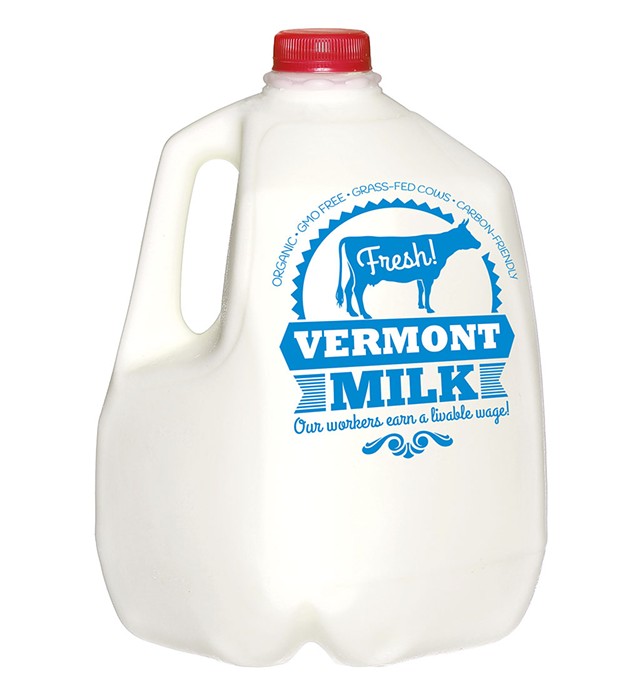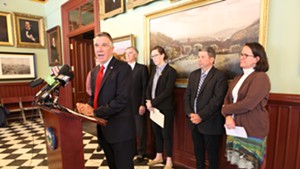
An improbable coalition is calling for dramatic changes to the state's dairy industry. Former agriculture secretary Roger Allbee has joined forces with three longtime environmental activists to argue that depressed milk prices, the need to reduce water pollution, and uncertainty about trade and migrant labor at the federal level present a unique opportunity to reinvigorate Vermont dairy farming.
"A perfect storm is brewing," Allbee told the House Agriculture and Forestry Committee earlier this month. "Vermont has the rare opportunity of helping rescue its largest agricultural industry and to plot a future agriculture [system] for the state that is uniquely Vermont."
The goal: to develop a set of environmental and ethical standards for dairy farms and build a made-in-Vermont brand that would bring farmers a premium price for their milk. Farms would have to meet those requirements — which could go above and beyond using organic practices — to qualify for using the state seal.
Requirements could include providing a livable wage and decent housing to farmworkers, allowing cows to graze on grassland, using non-GMO corn, forgoing pesticides and synthetic fertilizer, and cultivating carbon-rich soil. State financial incentives would encourage, rather than force, farms to make the transition.
"Our model is broken," said Allbee, though he added: "I recognize that all dairy farmers cannot go organic."
In addition to making its pitch to the legislature, the loose alliance of activists is meeting with government officials, writing op-eds and pressuring Vermont's largest milk customers, which rely on conventional milk.
The Green Mountain State's conventional dairy farmers have struggled for decades. Unlike farmstead cheese, milk is a commodity. Consumers don't differentiate Vermont milk from that produced in Wisconsin or Idaho. So farmers here are subject to the price volatility of an international market and to increasing competition from larger farms able to produce cheaper milk. Vermont currently has 838 dairy farms, down 158 from five years ago, according to the Agency of Agriculture, Food & Markets. The number of cows declined by 4,000, to 130,000, during the same time period.
Persistently low prices have further squeezed Vermont's farmers in recent years. Milk has been selling for less than what it costs to produce, and a federal price insurance program has failed to provide much relief. At the same time, farmers are under mounting pressure to reduce water pollution as the state launches a concerted effort to clean up Lake Champlain and other waterways. Runoff of manure and fertilizer from farms contributes roughly 40 percent of the phosphorous contaminating the waters.
Beginning in the 1990s, some conventional farms converted to organic, which brought higher and more stable prices. For the last eight years, the number of organic dairy farms has held steady at around 200, and there have long been calls to increase that number.
Some think the time is ripe for dairy reform. "Certainly there's more reason to change now than there ever has been," said Jack Lazor, who owns the organic Butterworks Farm in Westfield. Allbee's involvement, he added, brings credibility to the cause. "I've been rattling this cage for my whole agricultural career," said Lazor, "but ... I'm a hippie type."
In a September op-ed, the former agriculture secretary wrote that the state should move quickly to "emulate what Denmark is doing by becoming an organic milk-producing state."
Allbee's stance caught the attention of longtime organic proselytizers Will Allen; his wife, Kate Duesterberg; and Michael Colby. They had recently formed a nonprofit called Regeneration Vermont, with the mission of using agriculture to mitigate, rather than contribute to, climate change — by going organic and using carbon sequestration techniques. Adding compost to soil, planting cover crops and using no-till techniques can all increase soil's ability to retain carbon, keeping it out of the atmosphere.
When Allen introduced himself to the House Agriculture Committee, he said, "I've been arrested in all of our congressional offices." That was for protesting the Iraq War. Allen helped lead the Vermont Right to Know GMOs coalition, which is credited with getting Vermont's GMO labeling law passed.
He's also been an organic farmer for 40 years. He and his wife own Cedar Circle Farm in East Thetford, which produces fruits, vegetables and flowers. Duesterberg has spent her career working on sustainable agriculture projects, and the couple also runs education programs at the farm.
"In this case, we feel the timing is right for us to be aggressive, because the dairy system is in deep trouble," Allen explained during an interview at Cedar Circle's headquarters in an old farmhouse. Bundles of dried clover were stashed around the room, and old anti-GMO bumper stickers filled a box in a corner.
"We had made this impact with GMO labeling. We had that momentum going," Duesterberg said, adding that the state's focus on water-quality measures presents another opportunity.
"We're dreamers," Colby confessed. Like Allen, he's also been arrested for protesting the Iraq War. As executive director of a Vermont-based nonprofit called Food & Water, he has advocated for food safety issues, including pressuring companies to stop giving cows the growth hormone rBST.
Colby lives in Walden, where he produces maple syrup and harvests timber with two Belgian draft horses.
Allen, Duesterberg and Colby are exactly who you'd expect to be pushing this cause — the type of earnest, uncompromising environmentalists who are easy for conventional farmers to dismiss.
Allbee, on the other hand, was raised on a dairy farm in Brookline, graduated from the University of Vermont with a bachelor's degree in agricultural economics, served in the U.S. Army, was a staffer on the U.S. House Agriculture Committee for then-congressman Jim Jeffords and later became secretary of agriculture for then-governor Jim Douglas. (His identical twin brother, Ronald, held the same position under governor Madeleine Kunin.)
Currently CEO of Grace Cottage hospital, Allbee, who lives in Townshend, said he decided to start speaking out about Vermont's "dairy crisis" after watching milk prices plummet. Concluding that "the solution is not in D.C.," he began advocating at the local level.
In December, he and the Regeneration Vermont founders drafted an open letter to Phil Scott calling on the incoming governor to "work with us, with dairy industry leaders and others to support and facilitate the necessary statewide transition to regenerative and organic dairy production." They convinced a number of organizations to sign on. Most had environmental missions, including Lake Champlain International, the Conservation Law Foundation and the Vermont Public Interest Research Group.
Lazor was among the signers. Although he doesn't fully agree with their vision, it aligns with his central goal, which is to help farms "keep carbon in the ground," he said.
Noticeably absent among the signatories were conventional farmers.
"I'm not really sure what this exercise is about," said Amanda St. Pierre. She and her husband run a large conventional farm in Berkshire that's been in the family for five generations. "I think both organic and conventional serve a market."
St. Pierre is a member of Vermont Dairy Producers Alliance, a group that formed last year to advocate for farmers after the state passed strict water-quality requirements. Its members are all conventional farmers, though all farmers are welcome, St. Pierre said.
Regeneration Vermont hopes Scott's agriculture secretary, Anson Tebbetts, will be sympathetic to their cause. Tebbetts grew up on a dairy farm in Cabot that became the third Vermont farm to go organic. A decade ago, he served as Allbee's deputy in the Agency of Agriculture.
"He certainly has stirred the pot," Tebbetts said of his former boss. The new secretary said he's agreed to meet with the group but was noncommittal. "I haven't formed any opinions on this," he said. "The only opinion I have is, I don't want to waste any energy pitting one form of farming against another form of farming."
Heather Darby, an agronomist who works for the UVM Extension program, hopes the agency will hear out the "regeneration" proponents. "I think some of their points are really valid, like how come the state isn't more proactive about looking for opportunities to increase the value of milk outside of it just being milk."
But she's skeptical, too. "Farmers need to have a market for whatever they're producing," she said. Farmers generally secure contracts with milk buyers before going organic, and at the moment, she noted, buyers aren't signing any. "The organic milk market right now is already taxed."
That could change, but rather than call on cash-strapped farmers to take a leap of faith, Allbee and company are prodding buyers to lead the way. Companies such as Ben & Jerry's could help create the market, they reason, by choosing to buy sustainably produced milk.
It's a strategy Allen has had success with in the past. As a cofounder of the Sustainable Cotton Project, he helped convince Patagonia to make its clothing with organic cotton, spurring some suppliers to make the transition.
Allen said one of his Patagonia contacts put him in touch with Ben & Jerry's staff. In January, the ice cream company posted a "dairy statement" on its website in response. Acknowledging Regeneration Vermont's campaign, it noted, "We share their vision of a strong, regenerative agricultural model for Vermont dairy."
After describing its sustainability work, including the voluntary Caring Dairy program, which encourages farmers to meet certain environmental, labor and animal welfare standards, it offered a hesitant mea culpa: "We recognize that we are operating in the same broken system that is failing our dairy farmers, and we are actively exploring ways to change that — to create a more viable system ... We hear and understand the urgency to come up with solutions. We are working now to define our path forward and plan to share our plans as soon as possible in 2017."
A spokesperson declined to comment further.
The group is likely to have less luck with Cabot, which is owned by the Agri-Mark Family Dairy Farms cooperative. According to spokesperson Doug Dimento, Cabot "processes more Vermont milk than any other milk handler."
Is the cheese company considering Regeneration Vermont's idea?
"No," Dimento said flatly.
"We used to make organic dairy products in the early 2000s," he noted. "We couldn't sell enough to keep producing it." Even though it relies primarily on conventional milk today, Cabot encourages sustainable agriculture, Dimento said.
"Who are these people to tell dairy farmers what to do?" he added.
Lazor has a different perspective: "The fact that it's at least being discussed is a pretty darn good start."











Comments (5)
Showing 1-5 of 5
Comments are closed.
From 2014-2020, Seven Days allowed readers to comment on all stories posted on our website. While we've appreciated the suggestions and insights, right now Seven Days is prioritizing our core mission — producing high-quality, responsible local journalism — over moderating online debates between readers.
To criticize, correct or praise our reporting, please send us a letter to the editor or send us a tip. We’ll check it out and report the results.
Online comments may return when we have better tech tools for managing them. Thanks for reading.